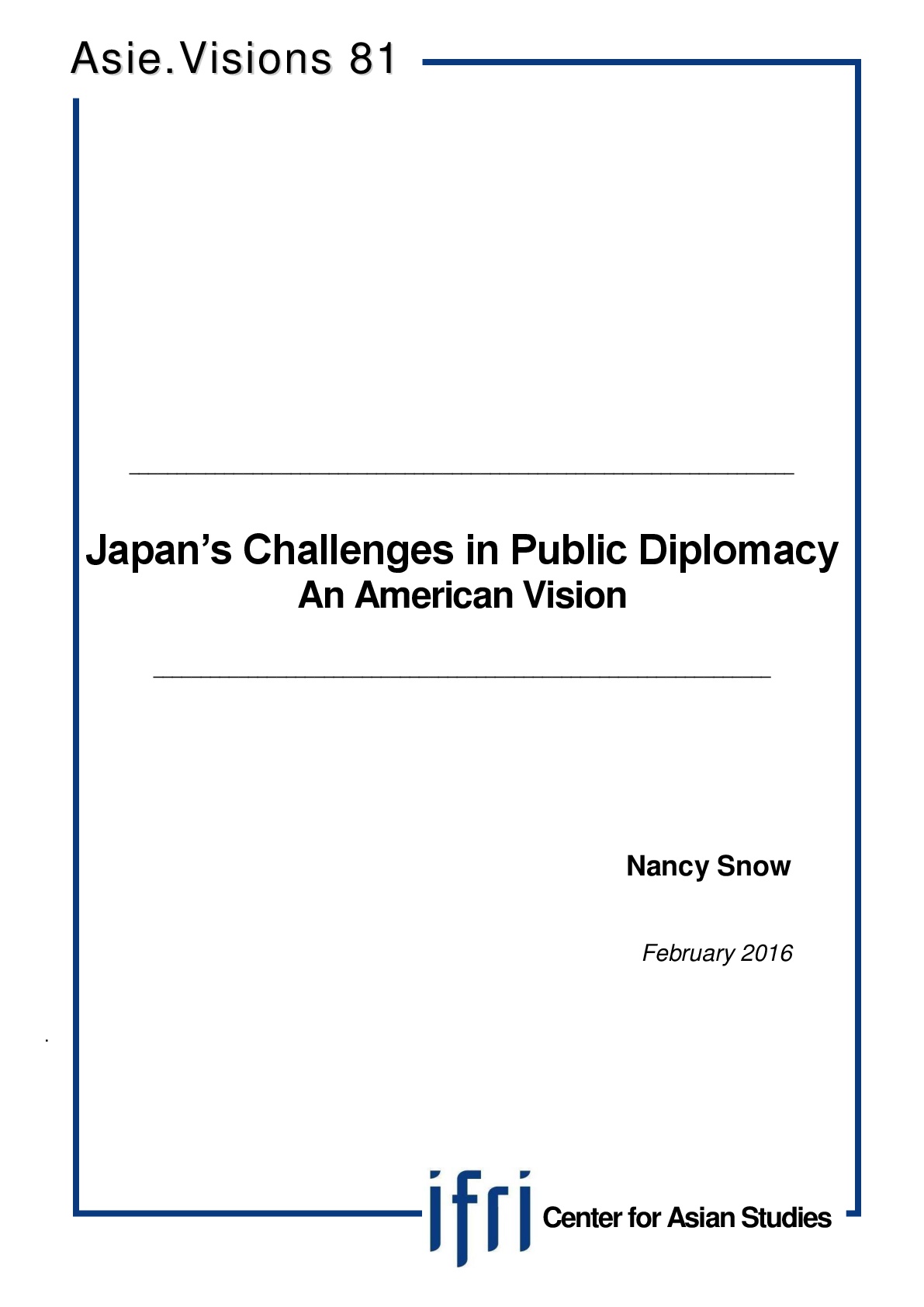Japan's Challenges in Public Diplomacy, An American Vision

Japan’s public diplomacy (PD) profile rests almost exclusively on the promotion of its cultural soft power. Today, in the complex geopolitical setting of Asia, in which national rivalries are reviving competing wartime history narratives and territorial disputes, this approach is no longer sufficient to advance Japan’s own national interests and gain favorable opinion abroad. Under the Prime Minister Abe, Japan has begun to transform and upgrade its public diplomacy. However, the country is still facing a number of challenges.

First, Northeast Asia is a complicated region to navigate: despite strong economic interdependence, countries are jockeying for influence, and the competition among national narratives is fierce. Second, Japan has a mixed image: the Cool Japan brand full of cute idols, anime and pop music has to coexist with the darker figure of a more nationalist Japan that aims to normalize its military status and reinterpret in a rosy way its war history. Third, Japan has yet to develop efficient tools to communicate with the world. If Shinzo Abe were successful in giving a new impetus to develop a truly global public diplomacy, developing new tools and narratives, his legacy is still mixed.
The paper suggests five paths Japan could follow to raise its international image and better communicate its story to the world. First, Japan should go beyond political personality in promoting its public diplomacy. Second, it should expand communication skills and public diplomacy study in its education system. Third, its PD should target not only foreign governments, but also people. Fourth, Japan should be careful to increase information sharing about itself. Fifth, national narrative and PD tools should be strengthened in a systemic manner.
Nancy Snow is the first public diplomacy professor in Japan, Pax Mundi Professor of Public Diplomacy, Kyoto University of Foreign Studies, where she is establishing Japan’s first academic initiative in global public diplomacy. She holds a Ph.D. in International Relations from the School of International Service, The American University in Washington, D.C. She has been a public diplomacy scholar-practitioner for over two decades, with two Fulbright fellowships (Germany, Japan) and an Abe Fellowship at Keio University. Snow worked in public diplomacy at both the State Department and the U.S. Information Agency as a Presidential Management Fellow.
Download the full analysis
This page contains only a summary of our work. If you would like to have access to all the information from our research on the subject, you can download the full version in PDF format.
Japan's Challenges in Public Diplomacy, An American Vision
Related centers and programs
Discover our other research centers and programsFind out more
Discover all our analysesEuropean Union-India: Lasting Rapprochement or Partnership of Convenience?
The partnership between the European Union (EU) and India has long been limited to economic exchanges. Its political dimension has gradually developed, culminating in its elevation to the status of a “strategic partnership” in 2004. However, the failure of negotiations for a free-trade agreement in 2013 slowed this momentum. Since the early 2020s, in an uncertain geopolitical context, bilateral rapprochement has gained new momentum.
Japan’s Takaichi Landslide: A New Face of Power
Prime Minister Sanae Takaichi has turned her exceptional popularity into a historic political victory. The snap elections of February 8 delivered an overwhelming majority for the Liberal Democratic Party (LDP), driven by strong support from young voters, drawn to her iconoclastic and dynamic image, and from conservative voters reassured by her vision of national assertiveness. This popularity lays the foundation for an ambitious strategy on both the domestic and international fronts.
The U.S. Policy Toward Taiwan Beyond Donald Trump: Mapping the American Stakeholders of U.S.-Taiwan Relations
Donald Trump’s return to the White House reintroduced acute uncertainty into the security commitment of the United States (U.S.) to Taiwan. Unlike President Joe Biden, who repeatedly stated the determination to defend Taiwan, President Trump refrains from commenting on the hypothetical U.S. response in the context of a cross-Strait crisis.

China’s Strategy Toward Pacific Island countries: Countering Taiwan and Western Influence
Over the past decade, China has deployed a diplomatic strategy toward the Pacific Island Countries (PICs). This strategy pursues two main objectives: countering Taiwan's diplomatic influence in the region and countering the influence of liberal democracies in what Beijing refers to as the "Global South."










